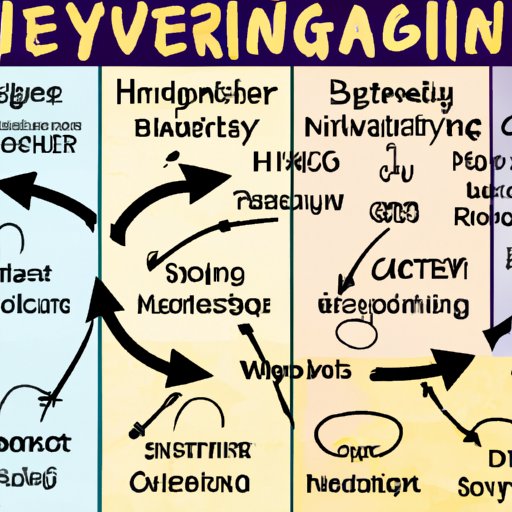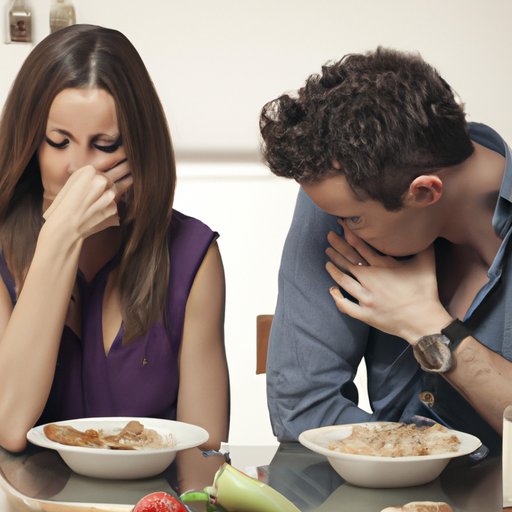Introduction
Binge Eating Disorder (BED) is an eating disorder characterized by recurrent episodes of consuming large amounts of food in a short period of time, often accompanied by feelings of guilt and shame. BED is the most common eating disorder in the United States, affecting 3.5% of women and 2% of men over their lifetime, according to a 2018 study published in the Journal of the American Medical Association. While it is not as widely known as other eating disorders, such as anorexia nervosa and bulimia nervosa, it can be just as serious and have significant impacts on a person’s physical and psychological health.

Identifying Patterns of Overeating and Eating When Not Hungry
One of the key signs of BED is eating when not physically hungry, or overeating. This could look like snacking throughout the day even when not hungry, or eating more than necessary at meal times. According to a 2018 study in the International Journal of Eating Disorders, people with BED also tend to eat faster than those without the disorder, and are more likely to eat until they feel uncomfortably full.
Certain factors can contribute to overeating, such as stress, environmental cues (such as seeing or smelling food), or being around others who are eating. Additionally, restrictive dieting has been linked to binge eating, as it can lead to a sense of deprivation and cause people to “give in” to cravings.

Noticing Large Amounts of Food Eaten in a Short Period of Time
Another warning sign of BED is eating large amounts of food in a short period of time. A person may go out of their way to buy large quantities of food, or stockpile food so they have it readily available when they are feeling the urge to binge. This type of behavior can have serious health consequences, including weight gain, high cholesterol, and an increased risk of developing type 2 diabetes.
It is important to pay attention to how much you are eating, as well as how quickly. If you find yourself consistently eating more than what is considered normal, it may be a sign of BED.

Feeling Guilty or Ashamed After Eating
After a binge episode, a person may experience feelings of guilt or shame. They may feel embarrassed about the amount of food they ate and regret their behavior. According to a 2017 study in the Journal of Behavioral Health Services & Research, these feelings of guilt and shame may be related to the person’s perception of their own body and self-image.
It is important to examine why these feelings may be present. Are you feeling guilty because you ate something that was unhealthy? Or are you feeling ashamed because you feel like you have no control over your eating? These feelings can be a red flag for BED.
Using Food to Cope with Emotional Distress
Many people use food as a way to cope with difficult emotions. Eating can provide a temporary distraction from stress or anxiety, and can give a person a sense of comfort. However, this can become problematic if it becomes a habit and is used as a primary coping mechanism. It can lead to an unhealthy relationship with food, which can lead to BED.
If you find yourself turning to food when feeling overwhelmed or distressed, it is important to explore alternative options for managing these emotions. Healthy coping mechanisms include talking to a friend or family member, exercising, journaling, or engaging in a creative activity.
Dealing with Difficult Feelings Through Food
It is also important to recognize when you are using food to deal with difficult feelings. For example, if you are feeling lonely and turn to food for comfort, this can be a sign of BED. The same is true if you are feeling angry or sad and turn to food as a way to cope. In these cases, it is important to find healthier ways to manage these feelings.
Healthy alternatives include talking to a therapist or counselor, practicing mindfulness, or engaging in activities that bring you joy. It can also be helpful to identify triggers that may lead to binge eating, such as certain situations or emotions, and develop strategies to cope with them.
Conclusion
Binge Eating Disorder is a serious condition that can have long-term health consequences. To determine if you may have BED, it is important to pay attention to patterns of overeating, eating large amounts of food in a short period of time, and feeling guilty or ashamed after eating. Additionally, be mindful of using food to cope with difficult emotions, and explore alternative options for managing emotional distress. If you suspect that you may have BED, it is important to seek professional help.
(Note: Is this article not meeting your expectations? Do you have knowledge or insights to share? Unlock new opportunities and expand your reach by joining our authors team. Click Registration to join us and share your expertise with our readers.)
